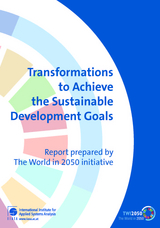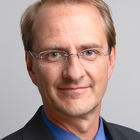Externe Publikationen

Framing and introduction
Messner, Dirk / Nebojsa Nakicenovic / Johan Rockström / Sebastian Busch / Geoff Clarke / Owen Gaffney / Caroline ZimmExterne Publikationen (2018)
in: Elmar Kriegler / Dirk Messner / Nebojsa Nakicenovic / Keywan Riahi / Johan Rockström / Jeffrey Sachs / Sander van der Leeuw / Detlef van Vuuren (eds.), Transformations to achieve the sustainable development goals; Report prepared by The World in 2050 Initiative, Laxenburg: International Institute for Applied Systems Analysis (IIASA), 29-35
One of the most pressing challenges humanity faces is how to realize the benefits of global social and economic development within a safe and just operating space of a stable Earth system. There is significant inequality between and within societies with billions left behind and overwhelming evidence of rising global risks due to ever-increasing human pressures on the planet. Ensuring future sustainable development for all will require socioeconomic development for improved human well-being while preserving Earth system resilience, referred to as sustainable development within planetary boundaries.In 2015, the United Nations adopted the 2030 Agenda for Sustainable Development including 17 Sustainable Development Goals (SDGs, UN, 2015b) which provide an aspirational narrative and goals for the desired future for human development with an actionable agenda to be achieved by 2030. It specifies far-reaching time-bound, often quantified, objectives based on the most comprehensive consultation held so far among nations. For the first time, a world development agenda is adopted that integrates far-reaching and aspirational goals for inclusive social and economic development, to occur within global environmental targets for oceans, freshwater, biodiversity, and climate, i.e., essentially a roadmap for redefining sustainable development as a people and planet agenda of achieving a prosperous and fair world within planetary boundaries. Together with the 2015 Paris Agreement (UNFCCC, 2015), which commits all signatories to a long-term target of holding global warming to well below 2°C above preindustrial levels, as well as the 2015 Addis Ababa Action Agenda (UN, 2015a), the 2030 Agenda recognizes the necessity of attaining social and economic development within the safe operating space of a stable and resilient Earth system. The High-level Political Forum (HLPF) on Sustainable Development is the United Nations central platform for the follow-up and review of the 2030 Agenda and the SDGs. The Forum, which meets annually, provides political leadership, guidance and recommendations on the 2030 Agenda’s implementation and follow-up; keeps track of progress of the SDGs; spurs coherent policies informed by evidence, science, and country experiences; and addresses new and emerging issues. Since the adoption of the 2030 Agenda, the Forum has chosen to undertake in-depth reviews of progress for a subset of related SDGs each year. In 2018, the theme will be Transformation towards sustainable and resilient societies under which Goals 6, 7, 11, 12, and 15 will be reviewed. Progress on Goal 17 – Strengthen the means of implementation and revitalize the Global Partnership for Sustainable Development, is reviewed each year.
Kontakt
Cornelia Hornschild
Koordinatorin Publikationen
E-Mail Cornelia.Hornschild@idos-research.de
Telefon +49 (0)228 94927-135
Fax +49 (0)228 94927-130
Alexandra Fante
Bibliothekarin/Open Access-Koordinatorin
E-Mail Alexandra.Fante@idos-research.de
Telefon +49 (0)228 94927-321
Fax +49 (0)228 94927-130



